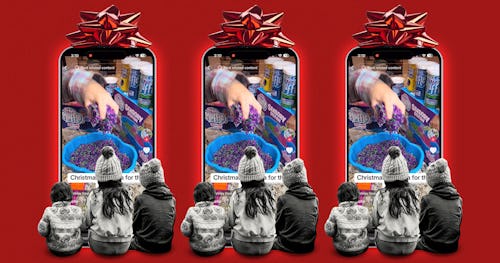
Last week, a toy catalog appeared in our mailbox. I excitedly ran inside to show my kids, suggesting they go through and circle items that struck their fancy. I remember doing this myself, with great excitement, when that giant Toys “R” Us wish book hit our doorstep. My kids were nonplussed. Sure, my first grader circled some things she "had already seen ads for" and noted a few toys she had watched a YouTuber unbox. My tweens and teen, though... their entire wishlist is driven by the algorithm within their phones. I have to admit that while we love and embrace tech as a family, this particular shift breaks my heart — just a little bit.
As technology advances, all of us — not just the kids — get an increasingly narrow view of the products, services, news, and interests that are out there in the world. In the era of the FYP, most of us have little chance to look beyond what the lines of code are telling us to watch or purchase unless we make a concerted effort to seek info elsewhere. So I was not surprised that one of my kids had a wish list composed of screenshots of sports gear ads — he’s an athletic kid, and mostly watches football game replays on YouTube.
What did surprise me, though, is that he hasn't seen ads for science kits, books, or things that fit his other interests. I understand this is how the internet works — How many times have I googled some random topic and gotten ads for related products for days afterward? — but, as a mom, it makes me sad. Of course we still know our kids best and shop for a wide variety of things that encourage curiosity, entertainment, and learning, but most of those items are things our kids have never seen. Rather than getting curious about what might delight them, our kids have a gift guide designed for them by an algorithm.
And those suggested toys or outfits that their favorite kidfluencer is pushing? Most of them suck. I indulge their desire for some of these algorithm-driven wants like a lollipop launching machine or a “viral pop-it” handheld game. Bu while we often have fun with these toys for a bit, inevitably they lose interest.
I was excited about one new toy this year — the Loop Lasso — and thought for the first time in ages my teen and tweens might think something I chose was “fire.” Before I even got a chance to stuff any stockings, one of my kids opened the package that was tempting him on the front stoop. The good news: They loved them.
Buoyed with confidence in my gift-selection spidey senses, I’ve begun to see if I can influence my kids more than the algorithm. “Oh, look,” I say, while flipping through the Target catalog. “These Storyphones look like a great way to listen to audiobooks when we don’t have your tablet,” I tell my 6-year-old. She excitedly adds them to her list.
Wow. Do I have as much sway as the Internet Gods? Maybe. I do know my own kids better than they do (I think).
I try this same tactic with my big kids, too. The key with adolescents is to let them think something was their idea — because it if was my idea, it's cringe. While my tween daughter loads her virtual list up with lofty brands like Drunk Elephant and Sol de Janeiro, I start to wax poetic about the cute (and more affordable) holiday sets my own mom added to my stocking from Bath and Body Works.
“Ooooh, those are cute!” she told me. “I want that!”
High on my success, I began to hack my kids’ algorithm a little, day by day. I mention that their favorite podcast, Wow in the World, has a new line of STEM toys— I even pull it up on their phones to actually influence their algorithm. Deftly, one kid adds the break-open crystal geodes kit to their list. Another decides they wanted a ChessUp smart chess board after I suggest it may improve their strategy when playing regular chess with friends.
I am not naive enough to think the internet will stop influencing my kids’ wish lists or shopping choices. I can barely escape it myself as another Instagram ad sucks me in (OK, but I did need a wearable down sports blanket). At the same time, I want my kids to receive engaging and high-quality gifts that won’t be forgotten by the time school’s back in session, and it’s become clear to me that in today’s digital world, that’s going to take some extra effort on my part.
0 comments:
Post a Comment